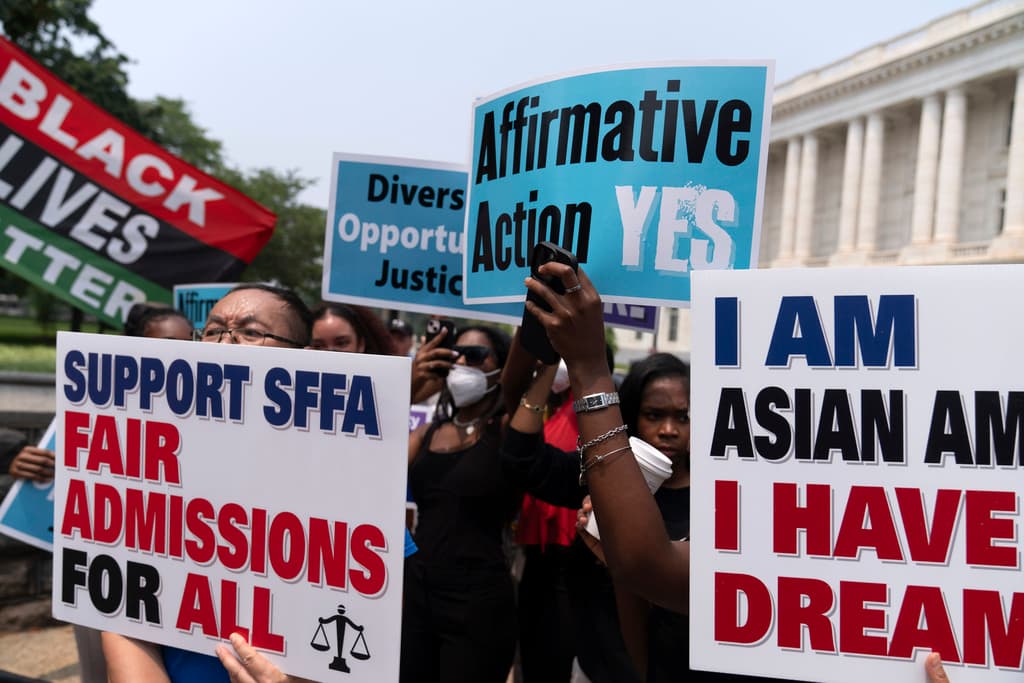Corporate America Reels From Conflicting Guidance on Affirmative Action in Wake of Court Ruling on College Admissions
Attorneys general from dozens of states offer conflicting advice on whether affirmative action is legal in corporate America following the court’s ruling in Students for Fair Admissions v. Harvard.

In yet another sign of the widening reverberations from last month’s Supreme Court decision banning affirmative action in college admissions, a group of Republican attorneys general representing 13 states has reached out to the leadership of some of America’s top corporations, reminding them that any use of racial preferences in hiring, promotions, or contracting is illegal and presents a legal liability to the companies that practice them.
In a letter to the chief executives of all Fortune 100 companies, the state officials cited last month’s ruling as an impetus for the warning. As the court reminded us in its decision, the letter says, “all racial discrimination, no matter the motivation, is invidious and unlawful.” While the court’s decision only affects college admissions, it has prompted a flurry of efforts by conservatives to address affirmative action and racial discrimination in other settings as well.
“Treating people differently because of the color of their skin, even for benign purposes, is unlawful and wrong,” the letter says. “Companies that engage in racial discrimination should and will face serious legal consequences.”
The attorney general of Kansas, Kris Kobach, and his counterpart from Tennessee, Jonathan Skrmetti, headlined the letter, which was signed by their colleagues from 11 other states, including Alabama, Arkansas, Indiana, Iowa, Kentucky, Mississippi, Missouri, Montana, Nebraska, South Carolina, and West Virginia.
In response, Democratic attorneys general this week fired off their own letter to the same group of recipients, urging the companies to stay the course. “The letter you received from the 13 state attorneys general is intended to intimidate you into rolling back the progress many of you have made,” the Democratic letter says. “We write to reassure you that corporate efforts to recruit diverse workforces and create inclusive work environments are legal and reduce corporate risk for claims of discrimination.”
Mr. Klobach said the GOP letter was precipitated by the Supreme Court decision in Students for Fair Admissions v. Harvard and the overt and ongoing use of racial preferences by most of the companies receiving the letter. “The time has come for Martin Luther King Jr.’s dream to reflect reality,” he said. “All Americans should be judged based on the content of their character, not the color of their skin.”
The GOP attorneys general cited dozens of examples of companies boasting about instituting race-based preferences both in press reports and public statements. Goldman Sachs, the letter says, routinely sets racial quotas for the hiring of new analysts and entry-level associates, and a number of the tech industry’s major players — among them Google, Cisco, Apple, and Uber — have announced similar efforts.
Microsoft, the letter says, has racial quotas for the number of Black-owned suppliers that it does business with and demands annual diversity disclosures from its top 100 suppliers. The company also has quotas for the number of Black-owned banks that it does business with, the letter says.
“Such overt and pervasive racial discrimination in the employment and contracting practices of Fortune 100 companies compels us to remind you of the obvious: Racial discrimination is both immoral and illegal,” the letter states. “Such race-based employment and contracting violates both state and federal law, and as the chief law enforcement officers of our respective states we intend to enforce the law vigorously.”
“We urge you to immediately cease any unlawful race-based quotas or preferences your company has adopted for its employment and contracting practices,” the GOP letter concludes. “If you choose not to do so, know that you will be held accountable — sooner rather than later — for your decision to continue treating people differently because of the color of their skin.”

